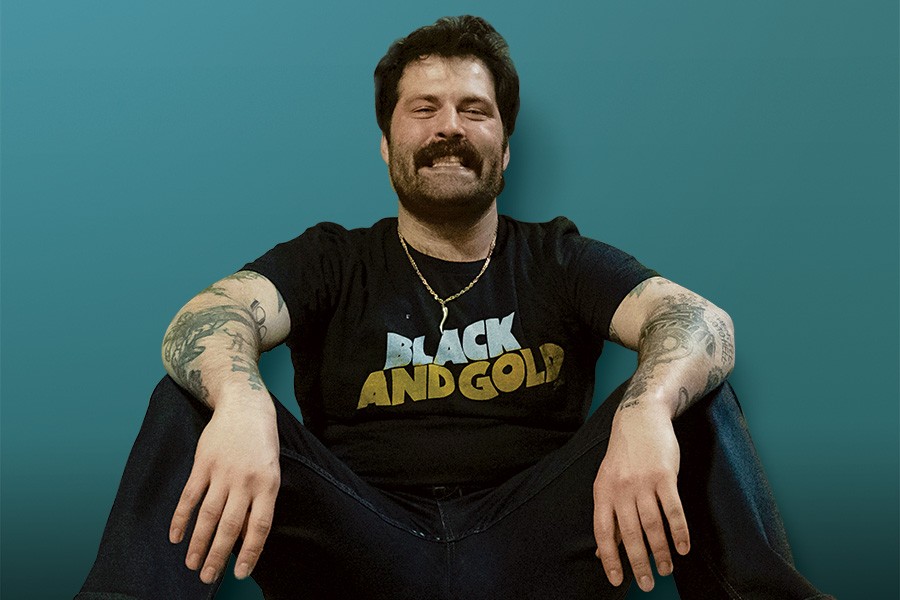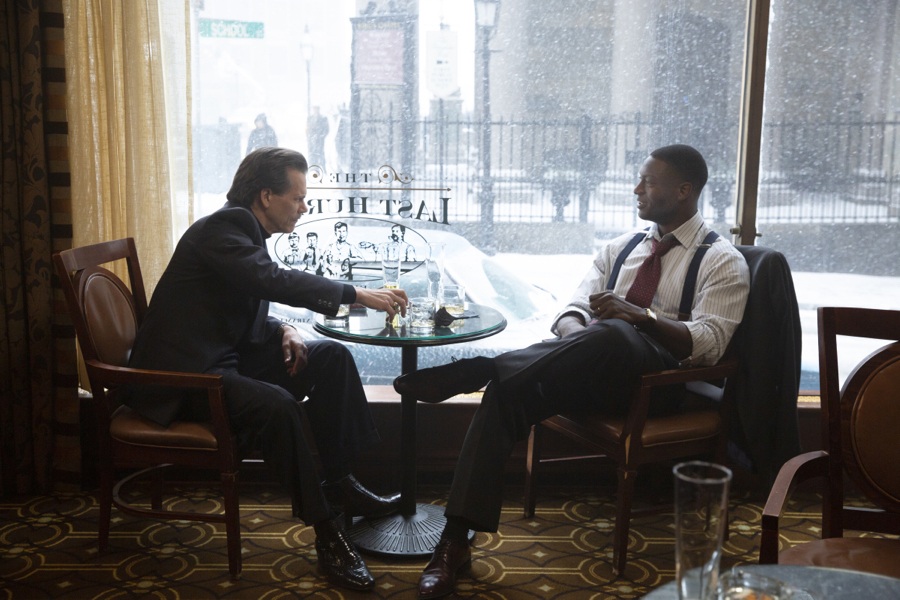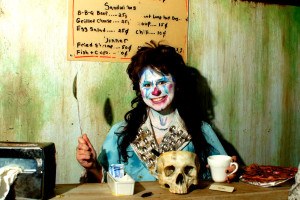Meet Chuck MacLean, the Extremely Boston Voice of “City on a Hill”
The creator and executive producer of the upcoming Showtime drama about Boston’s gritty past is a smart-ass brawler from Quincy. (Which means he just might get this city right.)

Photo courtesy of Showtime
For much of Chuck MacLean’s life, being a brash loudmouth from Quincy was a liability, infuriating administrators while he was studying at Emerson College and exasperating his editors at the Boston Herald. But at a time when Hollywood is obsessed with gritty Hub dramas, the screenwriter has now found a marketable niche in L.A. as the Guy Who Gets Boston, teaming up with none other than Ben Affleck and Matt Damon on their latest project: City on a Hill, a fictionalized look, debuting Sunday, June 16 at 9 p.m. on Showtime, at the cops and crooks of 1990s Boston and how the era changed the city forever. In between takes on set in New York earlier this year, MacLean opened up about Affleck’s Dunkin’ habits, bad Boston accents, and the worst crime he ever committed within our city limits.
You’ve made a career writing about crime, but have you ever committed a crime here in Boston?
This is great. This will probably be the first and last interview Showtime lets me do. Let me think about what the statute of limitations is [laughs]. I mean, there are still buildings I’m banned from for life in Boston. Malicious destruction of private property would probably be the number one thing. Usually, what I was known for was getting out of it. That was my big talent. In my group of friends, I had the strongest accent, so I’d be shitfaced and have one eye hanging out of my head and the cops would show up and I’d be like, “Gentlemen, come on. What are we doing here?” And the cops would be like, “Get the hell out of here, you fucking moron.” Another time, when I was 19, I got pulled over by a state trooper. I had “suicide machine” spray-painted on the side of the car. The trooper had a ticket in his hand and he’s like, “What does ‘suicide machine’ mean?” I said, “You listen to Bruce Springsteen, trooper?” He ripped up the ticket.
Okay, give me your elevator pitch for City on a Hill. Why should Bostonians tune in?
I’m a huge Boston history geek. My place is wall to wall with stuff from Mayor Curley to the police strike in 1919. Stuff like that has always fascinated me. When Ben Affleck came to me with the idea of using his research for The Town and setting a story in the 1990s, the story that leapt out at me was the 1989 case of Charles Stuart [a white man who murdered his wife and fabricated a story about being robbed and shot by a black man]. And by 1998 you had the “Boston Miracle” [the result of efforts by police, community organizers, and religious leaders to drastically reduce the number of youth homicides in the city]. So, this is really a story about the change that took place in the ’90s: political change, law enforcement changes, societal change, economic change, one very cynical FBI agent, and one idealistic black Assistant District Attorney who sees this moment.
What makes that era such a dramatic one for the city?
The Charles Stuart disaster made the city look like this New England backwater that was still stuck in the 1950s—a national story about the corruption and the racism of the time that made the Boston Police a laughingstock. It was a disaster in terms of politics and law enforcement, and everything that culturally could go wrong did go wrong. In the aftermath, it created this opportunity for guys like Ralph Martin, the first black DA in Boston, to get that job, and it forced a lot of old guys in the police department to retire. At the time, [Mayor] Ray Flynn appointed his childhood pal as police commissioner—that stuff stopped. Meanwhile, a group of ministers and community leaders in Roxbury, Jamaica Plain, and Mattapan worked with Boston Police to change the way things were done. Corrupt political cronies were replaced by [Mayor Tom] Menino’s machine that built the city up. Over 20 years, major crime statistics drastically dropped in Boston. The city went from a recession in the late ’80s to a booming economy. In the arc of the show, you see how a backwater town turns into a world-class city, and it really only took a couple of people trying to do a good job.

Kevin Bacon as Jackie Rohr and Aldis Hodge as Decourcy Ward | Photo by Claire Folger/SHOWTIME
In the pilot episode, Kevin Bacon’s character, FBI agent Jackie Rohr, uses the N-word during the first minute of the show. Why did you make that choice?
I was trying to accurately depict what Northeast racism looks like as opposed to the way people sometimes think of it, which is, like, white parents throwing stones at black kids on a bus. It’s not just people carrying tiki torches that have this problem. It’s everyday people who you might think are really charming or funny, but this is part of their character. I grew up with that and I didn’t want to water it down. [Rohr] isn’t the stock racist in the show—he’s the main character and he’s just very casually throwing off that word. These people were offhand about their racism—it was pervasive and casual and bred-in, which has also made it hard to change. That’s the way a guy in his fifties working for the FBI in Boston, who’s corrupt, was talking in 1992. To depict that otherwise would just be a fairy tale.
Why does the world need another Boston crime show?
To call it a show about crime is like calling The Sopranos a show about gangsters. When I started as a screenwriter 10 years ago, all I wanted to write was drama, but you can’t sell drama. But if you put a heist in the middle of it, you can. There’s an armored-car robbery in the first 15 minutes, but this is a show about people struggling with change. It takes place in a city where everything was fucked, and here’s how people dealt with it.
How did you meet the Afflecks?
A producer put Casey and me together, and out of that came [the script for a movie called] Boston Strangler. We worked on that for two years and it almost got made. At that time, Ben and Matt Damon were trying to do their version of a Whitey Bulger story. Casey kept telling them, “You should hire Chuck.” So, when Matt and Ben wanted to do the TV show, I went in and met them. They pitched me on what they were looking to do, and I’d done my research, so I had a full 15-minute pitch ready. Ben Affleck is the best boss I’ve ever had. He literally just handed me a huge check and was like, “Go do your worst.”
Are you ever starstruck working for him?
I break his balls worse than anybody. At least once a week I’ll make fun of him growing up in Cambridge, and he’ll call me white trash from Quincy. I don’t know why he takes it from me, but he’s very paternal, very avuncular. He’s like, “I brought you into this world. I can take you out of it.”
We’ve heard that he drinks Dunkin’ Donuts every day. Is that true?
Yeah, we joke that the two of us can’t go 15 minutes without a Dunkin’ Donuts and a Newport cigarette. You can take us out of there, but you can’t take it out of us.
So it is true.
They should write him a check for that. I don’t know why they’re not paying him. If he’s not available, I’m very willing.
What was your experience like as a student at Emerson College?
They literally tried to kick me out every year. My whole life, I’d barely been outside the 495 belt, and I was just a goon. All I did was get shitfaced and get in fights. Paradoxically, I got a 4.0 [GPA]. I had an academic scholarship, but I was a hell-raiser. They’d threaten to kick me out and I’d be like, “Oh, kick out the working-class kid with a 4.0 GPA? Let’s see how that looks on the front page of the Herald tomorrow morning, especially when you’re not paying taxes on the prime real estate you have on Boston Common.” That kind of thing.
I didn’t know how good of a college Emerson was until I went to USC. [Pulitzer Prize–winning biographer and Emerson professor] Megan Marshall handled me more deftly than anybody. She just figured out, Okay, I’ll let him talk for 15 minutes and he’ll burn himself out. And then I can teach. I’d lay down in traffic for her.
You worked for the Herald and the Patriot Ledger after college. How long did that last?
I was the world’s worst journalist for six months. I’m 6 feet, 200 pounds, and loud. My first day at the Herald, three bosses pulled me aside and said, “Listen, you did a pretty good job, but everyone here hates you.” It didn’t work out. Then at the Patriot Ledger, I talked too much again. They had this nice, quiet atmosphere and then my fat mouth fell into it.

Jonathan Tucker as Frankie Ryan in CITY ON A HILL | Photo by Claire Folger/SHOWTIME
I hear you also played hockey. Did that go any better?
My dad’s a very quiet guy. The only time I ever heard him talk was to tell me at length how much he hated the Montreal Canadiens and how Bobby Orr should have won eight Stanley Cups. So I wanted to be Cam Neely. But I was a terrible hockey player. Couldn’t shoot. I played in college, but the only thing I could do was take a punch in the face and not go down. There’s no reason for Raging Bull on a Division III club team. It was terrible.
Are you any good in a fight?
I can take a punch, but that’s literally it. It’s a war of attrition with me. I remember getting in a fight with the entire third line of the Northeastern hockey team on Boston Common. There were a lot of them and not that many of us. Some guy tried to rip my eye out of my head, but he didn’t get it. So that’s how I am in a fight. I won’t go away. Someone is going to have to ask themselves, Is this worth it?
Your eye?
Yeah, someone tried to dig my eye out. I tell that story and people will have the same reaction you just had and I’m like [jokingly], “Didn’t get it, though!”
Worst fake Boston accent in a movie?
The Kennedy accents in Thirteen Days.
Best?
Johnny Depp in Blow. I tell actors to watch that—it’s really good, but he cheats it. The cheat is to just kind of curl up one side of your mouth and talk through that. That’s really the trick to a Boston accent if it’s not naturally there.
You’re not all that interested in Whitey Bulger. Why?
His drive just seems so simple, you know? He was just going to get what he wanted, and nothing stood in his way. [FBI Agent] John Connolly was the more interesting one to me.
What does Hollywood always get wrong about Boston?
They can’t nail down the sense of humor here. It’s one part completely cynical, and the other part is this weird appreciation for the absurd. If you can’t nail that down, you’ll never get Boston correct.
Are you comfortable with that role, Boston whisperer?
I mean, I would like to be that. I think that implies that I make a lot more money than I do.
Where do you eat when you’re back at home?
The original Kelly’s in Revere Beach. The cheeseburgers are the best in the world, which I don’t think people really know.
There’s talk that Mayor Marty Walsh might have ambitions for higher office. Would you vote for him?
I love Marty. I went into his office before we started shooting just to get the sort of “In the name of the Father and the Son” kind of signal from the man. He was just the nicest guy. Couldn’t have been more helpful. We spent a long time talking about Mayor Curley. He has a certain magnetism and honesty about him. Yeah, I would vote for Senator Walsh. I’d hand out signs.
You can catch City on a Hill beginning Sunday night on Showtime at 9 p.m. The season premiere is also available to stream for free on YouTube.


